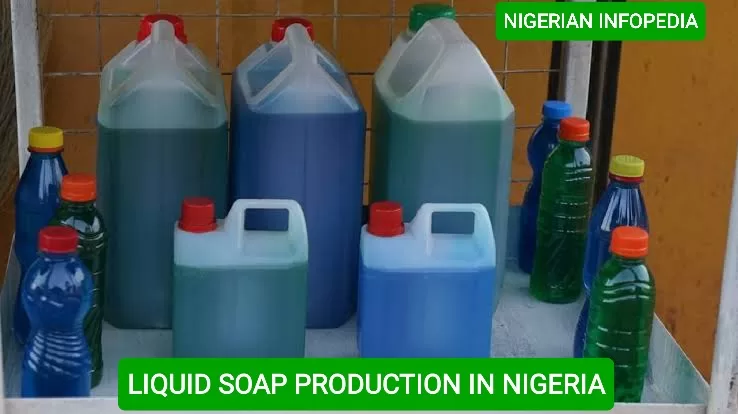Liquid Soap Production in Nigeria: Process & Cost of Materials (2026)
Liquid soap is a very essential household and personal care product that is used for washing and cleaning purposes. It is a form of soap that is produced in liquid form rather than in the solid form that is typical of traditional bar soaps. Liquid soap is preferred by many because it is more convenient to use and easier to measure out for specific cleaning needs.

In Nigeria, the demand for liquid soap has continued to grow over the years due to the increasing awareness of personal hygiene and the need for cleanliness in homes and workplaces. This has made liquid soap production a viable business opportunity for entrepreneurs and small business owners. In this article, we will explore the process and cost of materials for producing liquid soap in Nigeria.
PROCESS OF LIQUID SOAP PRODUCTION IN NIGERIA
The process of liquid soap production in Nigeria involves the following steps:
- Mixing: The first step in the production process is to mix the ingredients. The ingredients typically include water, Palm kernel, caustic soda (sodium hydroxide), sulphonic acid, and sodium laurel ether sulphate (SLES). These ingredients are mixed together in a large mixing tank.
- Heating: After the ingredients are mixed, the mixture is heated to a temperature of about 80 degrees Celsius. This helps to dissolve the ingredients and create a homogeneous mixture.
- Cooling: After heating, the mixture is allowed to cool down to about 50 degrees Celsius.
- Neutralization: At this stage, citric acid is added to the mixture to neutralize the caustic soda. This helps to balance the pH of the mixture.
- Thickening: The next step is to add salt to the mixture. This helps to thicken the liquid soap and create a stable product.
- Fragrance and color: Fragrance and color are then added to the mixture to give the liquid soap a pleasant scent and appearance.
- Packaging: Once the liquid soap is finished, it is then packaged in bottles, sachets or plastic containers.
It is important to note that safety measures must be taken during the production process, such as wearing protective gear and ensuring proper ventilation.
COST OF MATERIALS FOR LIQUID SOAP PRODUCTION
Liquid soap production in Nigeria has become a popular business venture due to the increasing demand for hygiene and cleanliness products. Liquid soap is a convenient and versatile cleaning product used in homes, offices, and other public places. The cost of materials used in liquid soap production in Nigeria is a crucial factor that determines the profitability of the business.
The cost of materials for producing liquid soap in Nigeria varies depending on the quantity of liquid soap to be produced. However, the following are the estimated costs of materials required for producing 20 liters of liquid soap:
- Caustic soda – ₦2,500
- Palm kernel oil – ₦7,000
- Soda ash – ₦1,500
- Sodium silicate – ₦2,500
- Colorant – ₦1,000
- Fragrance – ₦2,000
- Water – ₦0 (assumed to be readily available)
Total cost – ₦16,500
The cost of materials used in liquid soap production in Nigeria varies depending on the quantity of soap to be produced, the availability of raw materials, and the location of the production. The following are the major materials required for producing liquid soap and their estimated costs in Nigeria:
- Caustic soda – Caustic soda is a strong alkali used in soap making. It is used to convert fats and oils into soap through a process called saponification. The cost of caustic soda in Nigeria varies depending on the location and the quantity purchased. On average, a kilogram of caustic soda costs between ₦100 to ₦200. For the production of 20 liters of liquid soap, approximately 1kg of caustic soda is required, which would cost around ₦100 to ₦200.
- Palm kernel oil – Palm kernel oil is the main oil used in liquid soap production in Nigeria. It is a byproduct of palm oil extraction and is readily available in Nigeria. The cost of palm kernel oil in Nigeria varies depending on the location and the quantity purchased. On average, a liter of palm kernel oil costs between ₦350 to ₦450. For the production of 20 liters of liquid soap, approximately 7 liters of palm kernel oil is required, which would cost around ₦2,450 to ₦3,150.
- Soda ash – Soda ash is an alkali used in liquid soap production to neutralize the effect of the caustic soda. The cost of soda ash in Nigeria varies depending on the location and the quantity purchased. On average, a kilogram of soda ash costs between ₦100 to ₦200. For the production of 20 liters of liquid soap, approximately 1kg of soda ash is required, which would cost around ₦100 to ₦200.
- Sodium silicate – Sodium silicate is a thickening agent used in liquid soap production to give the soap a thick and smooth texture. The cost of sodium silicate in Nigeria varies depending on the location and the quantity purchased. On average, a liter of sodium silicate costs between ₦500 to ₦800. For the production of 20 liters of liquid soap, approximately 2.5 liters of sodium silicate is required, which would cost around ₦1,250 to ₦2,000.
- Colorant and fragrance – Colorants and fragrances are added to liquid soap to give it a pleasant scent and color. The cost of colorant and fragrance in Nigeria varies depending on the type and the quantity purchased. On average, a 100ml bottle of colorant and fragrance costs between ₦500 to ₦1,000. For the production of 20 liters of liquid soap, approximately 100ml of colorant and fragrance is required, which would cost around ₦500 to ₦1,000.
Overall, the cost of materials used in liquid soap production in Nigeria is relatively affordable, making it a viable business venture. However, the quality of the raw materials used and the production process must be of the highest standards to ensure a high-quality finished product that meets customers’ demands. It is important for entrepreneurs and small business owners to conduct thorough market research and price analysis before embarking on liquid soap production to ensure profitability and sustainability.
CONCLUSION
Liquid soap production is a viable business opportunity in Nigeria. The process of producing liquid soap is relatively simple and straightforward, and the cost of materials required is affordable. Entrepreneurs and small business owners can take advantage of the growing demand for liquid soap in Nigeria to start a profitable business venture. However, it is important to adhere to the recommended safety precautions when producing liquid soap to avoid accidents and ensure product quality.


